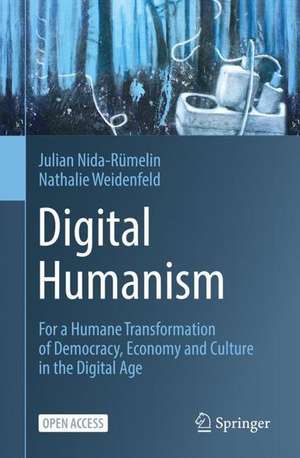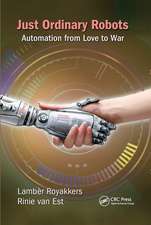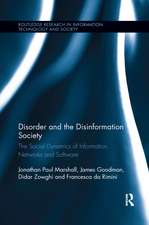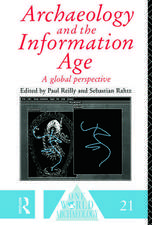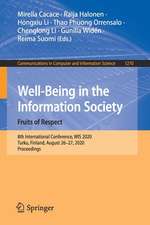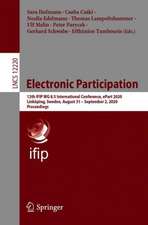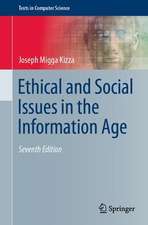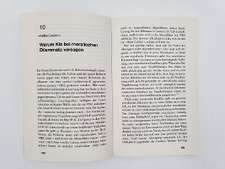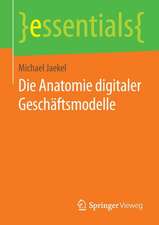Digital Humanism: For a Humane Transformation of Democracy, Economy and Culture in the Digital Age
Autor Julian Nida-Rümelin, Nathalie Weidenfelden Limba Engleză Paperback – 15 sep 2022
The advantage of this book is that it is philosophically sound and yet written in a way that will make it accessible for everybody interested in the subject. Every chapters begins with a film scene illustrating a precise philosophical problem with AI and how we look at it – making the book not only readable, but even entertaining. And after having read the book the reader will have a clear vision of what it means to live in a world where digitization and AI are central technologies for a better and more humane civilization.
Preț: 219.09 lei
Preț vechi: 273.87 lei
-20% Nou
Puncte Express: 329
Preț estimativ în valută:
41.93€ • 44.24$ • 34.94£
41.93€ • 44.24$ • 34.94£
Carte disponibilă
Livrare economică 12-26 decembrie
Livrare express 27 noiembrie-03 decembrie pentru 39.56 lei
Preluare comenzi: 021 569.72.76
Specificații
ISBN-13: 9783031124815
ISBN-10: 3031124812
Pagini: 127
Ilustrații: IX, 127 p. 1 illus.
Dimensiuni: 155 x 235 x 20 mm
Greutate: 0.2 kg
Ediția:1st ed. 2022
Editura: Springer International Publishing
Colecția Springer
Locul publicării:Cham, Switzerland
ISBN-10: 3031124812
Pagini: 127
Ilustrații: IX, 127 p. 1 illus.
Dimensiuni: 155 x 235 x 20 mm
Greutate: 0.2 kg
Ediția:1st ed. 2022
Editura: Springer International Publishing
Colecția Springer
Locul publicării:Cham, Switzerland
Cuprins
1. Introduction.- 2. Robots as New (Digital) Slaves.- 3. Digital Simulations of Emotions.- 4. The Problem of Autonomy and Determination in the Digital World.- 5. The World as the Perfect Machine Universe.- 6. Digital Optimization, Utilitarianism and AI.- 7. Economic Rationality as a Software Program.- 8. Why Robots Don't Have Moral Judgment.- 9. Ethical Non-Comparability.- 10. Why AIs Fail at Moral Dilemmas.- 11. Why AIs Can't Think.- 12. Digital Virtualities and Sober Realities.- 13. On the Ethics of Internet Communication.- 14. On the Ethics of Communication between Humans and AI.- 15. Cultural Aspects of Digitalisation.- 16. Digital Education.- 17. Utopia of Liquid Democracy.- 18. Socio-Economic Aspects of Digitisation.- 19. Transhumanist Temptations.- 20. On the Metaphysics of digitalisation.- 21. Afterword.
Notă biografică
Julian Nida-Rümelin is one of the most well-known philosophers in Germany and Europe and an important opinion leader in Germany who has published inside and outside of academia. He was State Minister for Culture in the socialist-green national government of Gerhard Schröder in 2001/2002. In 2017 the Bavarian Government awarded him with the Medal of the Bavarian State for special merits on the Bavarian economy and in 2019 he received the Bavarian Distinguished Service Award. Since 2020 he has been part of the German Ethics Council.
Nathalie Weidenfeld is a well-known author and acted as co-writer in this project. She published inside and outside academia and taught film at the Ludwig-Maximilians-Universität in Munich. She is part of the Bavarian Ethics Commission.
Nathalie Weidenfeld is a well-known author and acted as co-writer in this project. She published inside and outside academia and taught film at the Ludwig-Maximilians-Universität in Munich. She is part of the Bavarian Ethics Commission.
Textul de pe ultima copertă
This open access book deals with cultural and philosophical aspects of artificial intelligence (AI) and pleads for a “digital humanism”. This term is beginning to be en vogue everywhere. Due to a growing discontentment with the way digitalization is being used in the world, particularly formulated by former heroes of Internet, social media and search engine companies, philosophical as well as industrial thought leaders begin to plead for a humane use of digital tools. Yet the term “digital humanism” is a particular terminology that lacks a sound conceptual and philosophical basis and needs clarification still – and this gap is exactly filled by this book. It propagates a vision of society in which digitization is used to strengthen human self-determination, autonomy and dignity and whose time has come to be propagated throughout the world.
The advantage of this book is that it is philosophically sound and yet written in a way that will make it accessible for everybody interested in the subject. Every chapters begins with a film scene illustrating a precise philosophical problem with AI and how we look at it – making the book not only readable, but even entertaining. And after having read the book the reader will have a clear vision of what it means to live in a world where digitization and AI are central technologies for a better and more humane civilization.
The advantage of this book is that it is philosophically sound and yet written in a way that will make it accessible for everybody interested in the subject. Every chapters begins with a film scene illustrating a precise philosophical problem with AI and how we look at it – making the book not only readable, but even entertaining. And after having read the book the reader will have a clear vision of what it means to live in a world where digitization and AI are central technologies for a better and more humane civilization.
Caracteristici
This book is open access, which means that you have free and unlimited access Deals with cultural and philosophical aspects of artificial intelligence and pleads for a “digital humanism” Philosophically sound and yet written in a way that will make it accessible for everybody interested in the subject Provides a vision of what it means to live in a world where AI is a central technology for a more humane civilization
